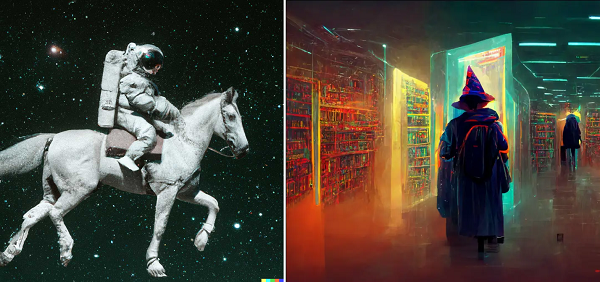Key factors:
- With AI generative instruments on the rise, a rising variety of creators are launching authorized motion to cease their work getting used as supply materials, which robs them of truthful compensation
- A collective of artists has launched a brand new case in opposition to MidJourney, Secure Diffusion and artwork web site DeviantArt for infringing the rights of creators
- Google has defined that it is not able to launch its personal AI instruments, on account of associated issues round potential misuse
Whereas AI era instruments like DALL-E and ChatGPT are producing wonderful outcomes, and sparking complete new varieties of enterprise alternatives, many questions have been raised in regards to the legality of such processes, and the way they supply the work of human creators for digital re-purposing.
Numerous artists, for instance, are offended that DALL-E can use work that they cost for because the supply materials for brand new photographs, for which they haven’t any authorized rights. A minimum of, they don’t proper now – which is one thing {that a} collective of artists is now trying to rectify in a brand new case.
As per The Verge:
“A trio of artists have launched a lawsuit in opposition to Stability AI and Midjourney, creators of AI artwork mills Secure Diffusion and Midjourney, and artist portfolio platform DeviantArt, which just lately created its personal AI artwork generator, DreamUp. The artists allege that these organizations have infringed the rights of ‘hundreds of thousands of artists’ by coaching their AI instruments on 5 billion photographs scraped from the online ‘without the condespatched of the original artists’.”
The swimsuit claims that a number of AI picture mills have successfully been stealing unique artwork, which then permits their customers to create comparable wanting work by utilizing particular prompts and guides.
And people prompts will be completely overt – for instance, within the DreamStudio information to writing higher AI prompts, it explains:
“To make your fashion extra particular, or the picture extra coherent, you need to use artists’ names in your immediate. As an illustration, if you would like a really summary picture, you’ll be able to add “within the fashion of Pablo Picasso” or simply merely, “Picasso”.
So it’s not simply coincidence in some instances, these instruments are prompting customers to copy the kinds of artists by guiding the instruments on this method.
Which, within the case of working artists, is a big concern, and one in all a number of key factors that’s more likely to be raised by way of the authorized proceedings on this new case.
It’s not the primary lawsuit referring to AI mills, and it definitely gained’t be the final. One other group is suing Microsoft, GitHub, and OpenAI over an AI programming software known as ‘CoPilot’, which produces code based mostly on examples sourced from the online, whereas varied photographers are additionally exploring their authorized rights to their photographs used within the ‘coaching’ of those AI fashions.
The priority round future litigation referring to such instruments is why Getty Pictures is refusing to record synthetic intelligence-generated artwork on the market on its web site, whereas Google has revealed a brand new weblog put up which outlines why it’s not releasing its personal AI era instruments to the general public at this stage.
As per Google:
“We imagine that getting AI proper – which to us includes innovating and delivering broadly accessible advantages to folks and society, whereas mitigating its dangers – have to be a collective effort involving us and others, together with researchers, builders, customers (people, companies, and different organizations), governments, regulators and residents. It’s crucial that we collectively earn public belief if AI is to ship on its potential for folks and society. As an organization, we embrace the chance to work with others to get AI proper.”
Google has additionally famous that AI-generated content material is in violation of its Search tips, and won’t be listed if detected.
So there is a vary of dangers and authorized challenges that might de-rail the rise of those instruments. However they’re unlikely to go away solely – and with Microsoft additionally trying to take a controlling stake in OpenAI, the corporate behind DALL-E and ChatGPT, it appears simply as potential that these instruments will turn into extra mainstream, versus being restricted.
In essence, the almost definitely consequence might be that these AI firms might want to come to phrases on sure utilization restrictions (i.e. artists will be capable to register their identify to cease folks utilizing it of their prompts), or prepare a type of cost to their supply suppliers. However AI generative instruments will stay, and can stay extremely accessible, in varied purposes, transferring ahead.
However there are dangers, and it’s price sustaining consciousness of such in your utilization, particularly as an increasing number of folks look to those instruments to save lots of money and time in varied types of content material creation.
As we’ve famous beforehand, AI era instruments needs to be used as complementary components, not as apps that wholly change human creation or course of. They are often extraordinarily useful on this context – however simply word that leaning too far into such may have damaging impacts, now and in future, relying on authorized subsequent steps.










![The Most Visited Websites in the World [Infographic]](https://newselfnewlife.com/wp-content/uploads/2025/05/Z3M6Ly9kaXZlc2l0ZS1zdG9yYWdlL2RpdmVpbWFnZS9tb3N0X3Zpc2l0ZWRfd2Vic2l0ZXMyLnBuZw.webp-120x86.webp)














